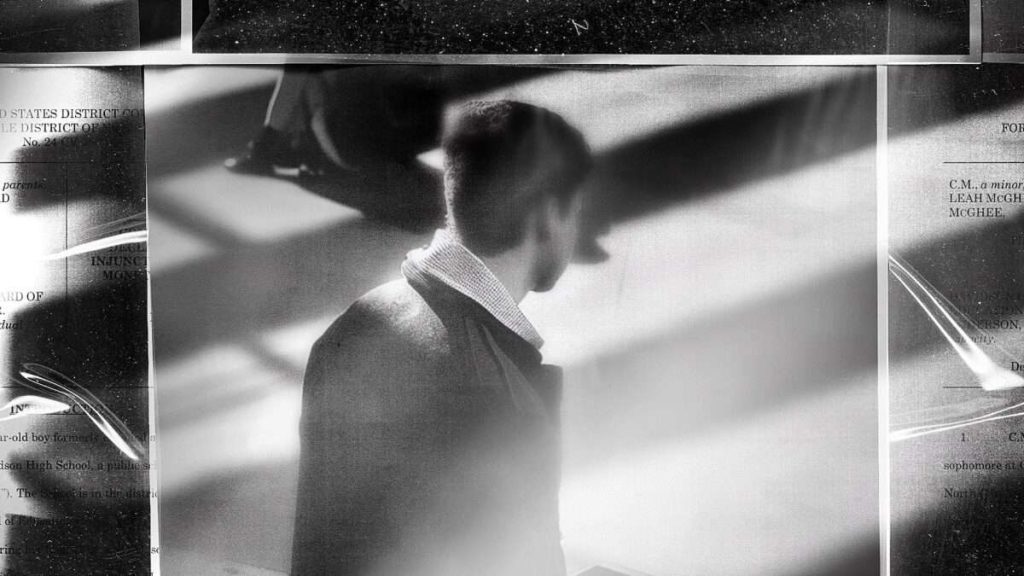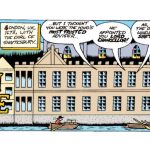A 16-year-old boy has kicked off a free speech debate—one that’s already attracting spectators beyond his North Carolina county—after he was suspended for allegedly “making a racially insensitive remark that caused a class disturbance.”
The racially insensitive remark: referring to undocumented immigrants as “illegal aliens.” Invoking that term would produce the beginning of a legal odyssey, still in its nascent stages, in the form of a federal lawsuit arguing that Central Davidson High School Assistant Principal Eric Anderson violated Christian McGhee’s free speech rights for temporarily barring him from class over a dispute about offensive language.
What constitutes offensive speech, of course, depends on who is evaluating. During an April English lesson, McGhee says he sought clarification on a vocabulary word: aliens. “Like space aliens,” he asked, “or illegal aliens without green cards?” In response, a Hispanic student—another minor whom the lawsuit references under the pseudonym “R.”—reportedly joked that he would “kick [McGhee’s] ass.”
The exchange prompted a meeting with Anderson, the assistant principal. “Mr. Anderson would later recall telling [McGhee] that it would have been more ‘respectful’ for [McGhee] to phrase his question by referring to ‘those people’ who ‘need a green card,'” McGhee’s complaint notes. “[McGhee] and R. have a good relationship. R. confided in [McGhee] that he was not ‘crying’ in his meeting with Anderson”—the principal allegedly claimed R. was indeed in tears over the exchange—”nor was he ‘upset’ or ‘offended’ by [McGhee’s] question. R. said, ‘If anyone is racist, it is [Mr. Anderson] since he asked me why my Spanish grade is so low’—an apparent reference to R.’s ethnicity.”
McGhee’s peer received a short in-school suspension, while McGhee was barred from campus for three days. He was not permitted an appeal, per the school district’s policy, which forecloses that avenue if a suspension is less than 10 days. And while a three-day suspension probably doesn’t sound like it would induce the sky to fall, McGhee’s suit notes that he hopes to secure an athletic scholarship for college, which may now be in jeopardy.
So the question of the hour: If the facts are as McGhee construed them, did Anderson violate the 16-year-old’s First Amendment rights? In terms of case law, the answer is a little more nebulous than you might expect. But it still seems that vindication is a likely outcome (and, at least in my opinion, rightfully so).
Where the judges fall may come down to a 60s-era ruling—Tinker v. Des Moines Independent Community School District—in which the Supreme Court sided with two students who wore black armbands to their public school in protest of the Vietnam War. “It can hardly be argued,” wrote Justice Abe Fortas for the majority, “that either students or teachers shed their constitutional rights to freedom of speech or expression at the schoolhouse gate.”
The Tinker decision carved out an exception: Schools can indeed seek to discourage and punish “actually or potentially disruptive conduct.” Potentially is a key word here, as Vikram David Amar, a professor of law at U.C. Davis, and Jason Mazzone, a professor of law at the University of Illinois at Urbana-Champaign, point out in Justia. In other words, under that decision, the disruption doesn’t actually have to materialize, just as, true to the name, an attempted murder does not materialize into an actual murder. But just as the government has a vested interest in punishing attempted crimes, so too can schools nip attempted disruptions in the bud.
“Yet all of this points up some problems with the Tinker disruption standard itself,” write Amar and Mazzone. “What if the likelihood of disruption exists only by virtue of an ignorance or misunderstanding or hypersensitivity or idiosyncrasy on the part of (even a fair number of) people who hear the remark? Wouldn’t allowing a school to punish the speaker under those circumstances amount to a problematic heckler’s veto?”
That would seem especially relevant here for a few reasons. The first: If McGhee’s account of his interaction with Anderson is truthful, then it was essentially Anderson who retroactively conjured a disruption that, per both McGhee and R., didn’t actually occur in any meaningful way. In some sense, a disruption did come to fruition, and it was allegedly manufactured by the person who did the punishing, not the ones who were punished.
But the second question is the more significant one: If McGhee’s conduct—merely mentioning “illegal aliens”—is found to qualify as potentially disturbance-inducing, then wouldn’t any controversial topic be fair game for public schools to censor? If a “disruption” is defined as anything that might offend, then we’re in trouble, as the Venn diagram of “things we all agree on as a nation” is essentially two lonely circles at this point. That is especially difficult to reconcile with the Supreme Court’s ruling in Tinker, which supposedly exists as a bulwark against state-sanctioned viewpoint discrimination and censorship.
It is also difficult to reconcile with the fact that, up until a few years ago, “illegal alien” was an official term the government used to describe undocumented immigrants. The Library of Congress stopped using the term in 2016, and President Joe Biden signed an executive order advising the federal government not to use the descriptor in 2021. To argue that three years later the term is now so offensive that a 16-year-old should know not to invoke it requires living in an alternate reality.
Those who prefer to opt for less-charged descriptors over “illegal alien”—I count myself in that camp—should also hope to see McGhee vindicated if his account withstands scrutiny in court. Most everything today, it seems, is political, which means a student with a more liberal-leaning lexicon could very well be the next one suspended from school.
The post This Student Was Allegedly Suspended for Saying ‘Illegal Aliens.’ Did That Violate the First Amendment? appeared first on Reason.com.







